Mini Reviews of the Contenders for Best Animated and Best Live Action Shorts
 Each year, millions of Oscar viewers who are inclined to play along at home picking and debating their own favorites hit a point in the telecast when all they can do is guess. This point, often thought of as the Oscar doldrums, is commonly the cluster of off-the-beaten path short film categories. These categories, while comparatively obscure compared to the headline-generating Best Actor, Best Actress and Best Picture categories, nonetheless absolutely deserve to be singled out on global television alongside of everything else. (After all, there’s a wide array of filmmaking going on out there!) But that doesn’t change the fact that unless one had the opportunity to catch these films at a shorts program in a major film festival, there’s very little chance of actually being familiar with these nominees. So, we guess what will win based upon the titles.
Each year, millions of Oscar viewers who are inclined to play along at home picking and debating their own favorites hit a point in the telecast when all they can do is guess. This point, often thought of as the Oscar doldrums, is commonly the cluster of off-the-beaten path short film categories. These categories, while comparatively obscure compared to the headline-generating Best Actor, Best Actress and Best Picture categories, nonetheless absolutely deserve to be singled out on global television alongside of everything else. (After all, there’s a wide array of filmmaking going on out there!) But that doesn’t change the fact that unless one had the opportunity to catch these films at a shorts program in a major film festival, there’s very little chance of actually being familiar with these nominees. So, we guess what will win based upon the titles.
That is, until recently! Starting February 25th The Academy of Motion Picture Arts & Sciences (AMPAS) will make the Oscar Nominated Short Films 2014 package available to all interested customers via iTunes/Amazon Instant Video and Pay Per View/VOD. If you’re really fortunate, you’ll be able to catch the program on the big screen prior to that date. But in case all those efforts fail you, we at ZekeFilm have seen fit to provide our own brief reviews of these nominees. Let the Oscar doldrums be a thing of the past, and get informed with us!
BEST ANIMATED SHORT FILM
Feral
(USA, 13 minutes)
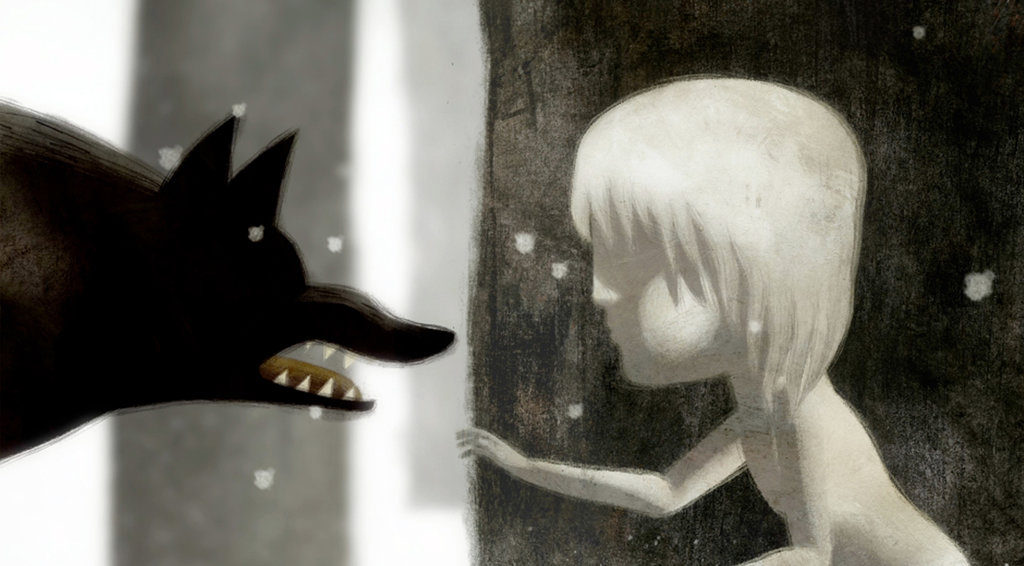
One of several wordless wonders occupying this category, animator Daniel Sousa’s mysterious Feral is essentially François Truffaut‘s 1970 period feature The Wild Child realized in thirteen minutes as a moody storybook fable. Those familiar with the underrated Truffaut film will likely have a harder time getting around the story similarities, as both films effectively explore ideas of socialization and how a radically different individual can or cannot integrate into certain cultures. But whatever Feral may lack in exact story freshness it more than makes up in the atmospheric animation department. Perspective and minimalist shapes as well as a finely tuned limited color palate carefully inform the action consistently throughout, to the point where dialogue, or even commonly expected details such as faces on the characters are not missed. Indeed, there’s a terrific sparseness to Feral, the characters appearing as living silhouettes of sorts. The 2D sketched paper cutout technique claims it’s aesthetic worthiness immediately, and is never not engaging. A melancholy cautionary tale for those whose good intentions might be otherwise seen as meddling. – Jim Tudor
Get a Horse!
(USA, 6 minutes)

The Disney short Get a Horse!, playing in theaters before the movie Frozen, fuses hand-drawn black and white animation (ala the Steamboat Willie era Mickey Mouse) with color, CGI, 3D animation. It’s an ambitious piece that not only breaks the fourth wall but smashes it to bits. Mickey and Minnie’s pleasant afternoon ride (with Horace Horsecollar and Clarabell Cow) is interrupted by Peg Leg Pete snatching Minnie. Things go further awry when the action bursts through the screen into full color and 3D, with Mickey now perched on the proscenium of a movie theater and Horace heading to the concession stand for snacks.
What follows blends the stepping-off-the-screen device used in movies like Sherlock Jr and The Purple Rose of Cairo with gags made possible by being on screen (running the film backward, flipping the screen, poking holes in the screen to save Minnie from drowning). The surreal, meta madness brings to mind the classic Looney Tunes Duck Amuck, in which Daffy Duck suffers indignities that can only come to a cartoon character (having his body erased, or being given sound effects in place of his voice). Get a Horse! shares that inventiveness and is also laugh out loud funny. It’s a promising debut from Lauren McMillan, the first woman to solo direct a Disney animated film. – Sharon Autenrieth
Mr. Hublot
(Luxembourg/France, 11 minutes)
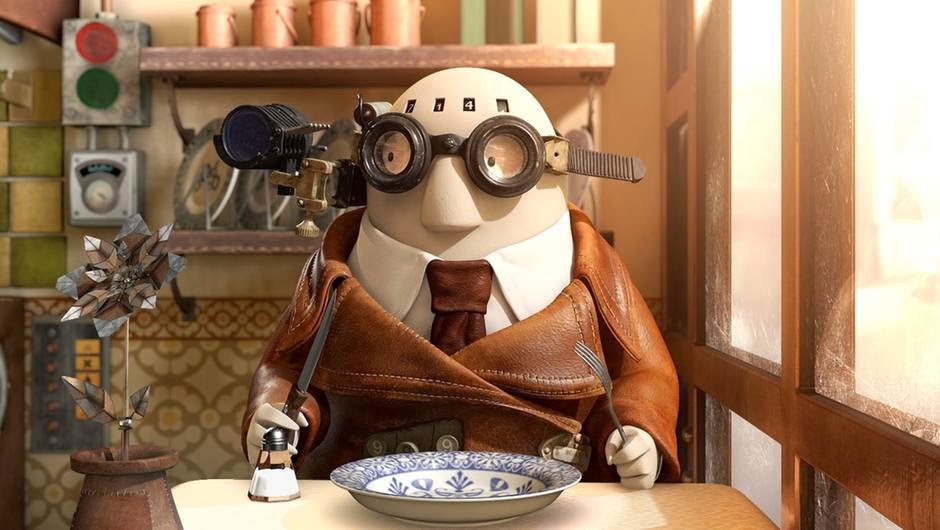
In a 3D workaday world populated entirely by non-speaking robots (most of which appear to be of the spring-wound cogs & clickers variety), Mr. Hublot is a well-meaning, set in his ways machine man (his likeness a cross between the flying handyman who tinkered with the THX logo prior to theatrical movies back in the day, and Tik-Tok the clockwork man from the Oz stories) living in a modestly small apartment, all alone. That is, until he one day befriends a small mechanical puppy on the streets outside his dwelling. To go much further would spoil one of Mr. Hublot‘s more effective moments, so any plot round-up is best left with that. But suffice to say, Mr. Hublot packs more wit, vibrancy, detail and life into its wonderful eleven minutes than many full length feature films manage, period. While it’s unconfirmed whether or not this short will play in 3D for the theatrical run of the Oscar Shorts showcase, its apparent that as much care and attention to detail went into that aspect of Mr. Hublot as all the others. If 3D is an option, a quick warning – beware of self-propelled flying bots! – Jim Tudor
Possessions
(Japan, 14 minutes)

Oscar caliber Japanese Animation has typically been the realm of Hayao Miyazaki’s Ghibli Studios. The thrice-nominated Miyazaki has endeared American audiences to Japanese Animation with feature length films like Howl’s Moving Castle and the Oscar winning Spirited Away. The Best Animated Short Category has been curiously absent of Japanese nominees. Enter Shuhei Morita. Best known for his chilling short film Kakurenbo: Hide and Seek, Morita revisits the realm of Yokai (supernatural monsters) with the beautifully animated Possessions. The theme of Possessions is taken from the Japanese legend that after 100 years items gain souls and then play tricks on their owners—they become possessed, as it were. In Possessions, a weary traveler is caught in a thunderstorm and must seek refuge for the night in a lonely hut. Once inside he is greeted by worn and torn items who have lost their usefulness and now haunt passers by. Our traveler is something of a handyman, however, and takes it upon himself to repair the distraught poltergeist-like wares. Morita’s beautiful blending of cel shading and traditional, hand-drawn backgrounds reinforce his ideal that what was once old can be made new again; it just takes the work of a man possessed. – Victor Labrada
Room on the Broom
(United Kingdom, 25 minutes)

Based on the British children’s book by Julia Donaldson, the twenty-six minute Room on the Broom is an animated short enjoyable and appropriate for viewers of all ages, from the youngest of children to the most jaded of adults. The story, narrated in sparse storybook fashion by Simon Pegg, tells the tale of a kindhearted witch (voice of Gillian Anderson) who lives in the woods with her orange cat and free-floating broom. Before too long, they are zipping through the sky above the woods, but over and over again, their velocity claims important items, resulting in quick low-level searches. Each search turns up a new animal companion (voiced by Sally Hawkins and Martin Clunes, among others), each wistfully inquiring if there’s perhaps “room on the broom” of her/him as well. Eventually, a hungry, huge dragon comes along, breathing fire and making trouble for the crew. Nothing too harrowing, but there are adventurous stakes (and snakes!) along the way.
Created for the BBC, filmmakers Jan Lachauer and Max Lang have crafted a curious and satisfying blend of old school stop motion animation and 3D computer animation, without ever losing any of the children’s book charm inherent to the presentation. Room on the Broom is a lovingly realized and, yes, bewitching tale of charity, acceptance, and hospitality – even in the craziest of circumstances. – Jim Tudor
BEST LIVE ACTION SHORT FILM
Do I Have to Take Care of Everything?
(Finland, 7 minutes)
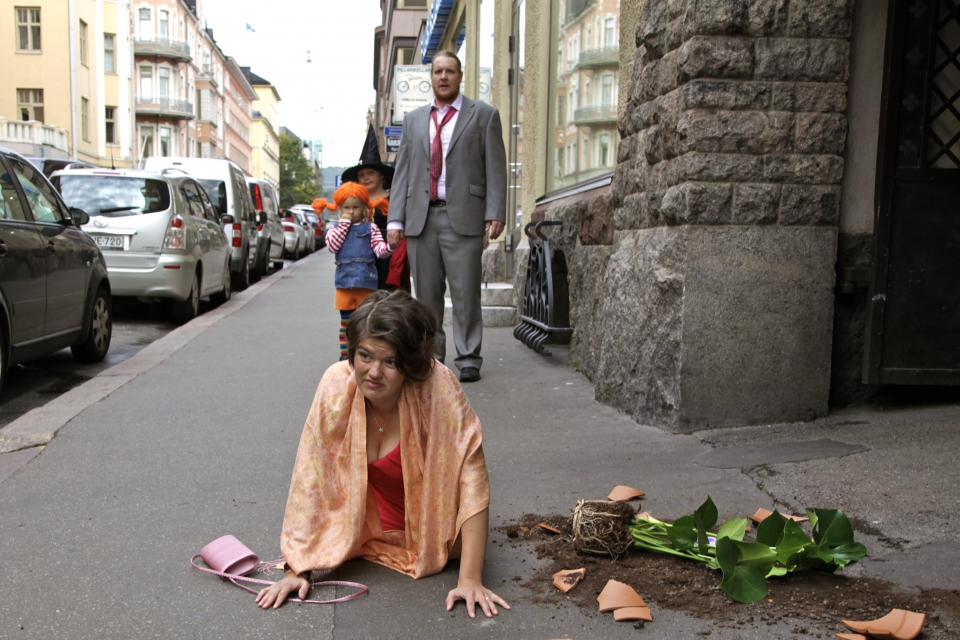
Trying to get the family out of the house and to a morning wedding on time is, at best, like herding cats and, at worst, an exercise in exhausting futility. Filmmakers Selma Vilhunen and Kirsikka Saari understand the female-centric frustration of this scenario, as the expectation and need to get dolled up in makeup, jewelry, and fancy clothes is far less applicable to men. So, for that matter, is the desire to attend most weddings. So naturally, the title sentiment is that of the flabbergasted mom, working chaotically in vain to get her family of four out the door in respectable fashion. Do I Have to Take Care of Everything? is under seven minutes of pure, relatable against-the-clock family chaos served up as comedy. To call it “charming” might be overselling it, but amid this Murphy’s Law morning there’s genuine laughs to be had, and a solid punchline at the end of it all. – Jim Tudor
Helium
(Denmark, 23 minutes)

Helium is a Danish short film that documents a series of conversations between a hospital janitor and a boy who is terminally ill. Enzo, the janitor, had a brother die when he was little and is able to empathize with this child. The child has been told that he is going to heaven soon by his parents and the hospital staff. Heaven has been described to him as a long sleep like when bears hibernate. This has no appeal to the boy. Enzo, noticing a series of zeppelins and air balloons strung about the hospital room begins to tell the boy of another destination called “Helium”. Through a series of conversations the small patient begins to dream of this place as it is being described to him. Looking much like Pandora from Avatar, the child can envision a fantastical world with whimsical music and more. The film does a fabulous job in a short time of instilling the importance of offering hope and dignity to those who are facing death. It also deals with the morality of providing hope through the vehicle of invented lies. Maybe the lies we invent aren’t for those facing death, but for those who will be left alone when the dying finally depart us. The final frame is a tender, sad, and overwhelming reminder of how much death there is and how much hope and dignity we have a chance to dispense to others. – Erik Yates
That Wasn’t Me
(Spain, 24 minutes)
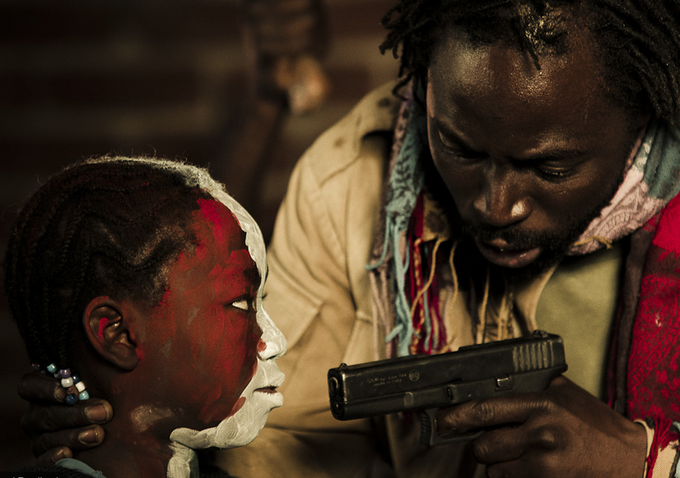
That wasn’t me tells the story of Paula, and her husband who are doctors working in a war-torn country in Africa. As they try to escape a civil war, they encounter a child soldier named Kaney. Kaney is introduced to us as a child around 8-10 years old, but we are provided evidence that this story is really being told through his eyes. As the story progresses, we witness the horrors of war, and are confronted with the loss of innocence by multiple characters in the film. The fact that the country is not named provides more of a current social commentary of the many disputes taking place on the African continent. It seeks to open our eyes to a reality we all need to address, as well as shakes our foundation in the notions of forgiveness and redemption. – Erik Yates
Just Before Losing Everything
(France, 30 minutes)
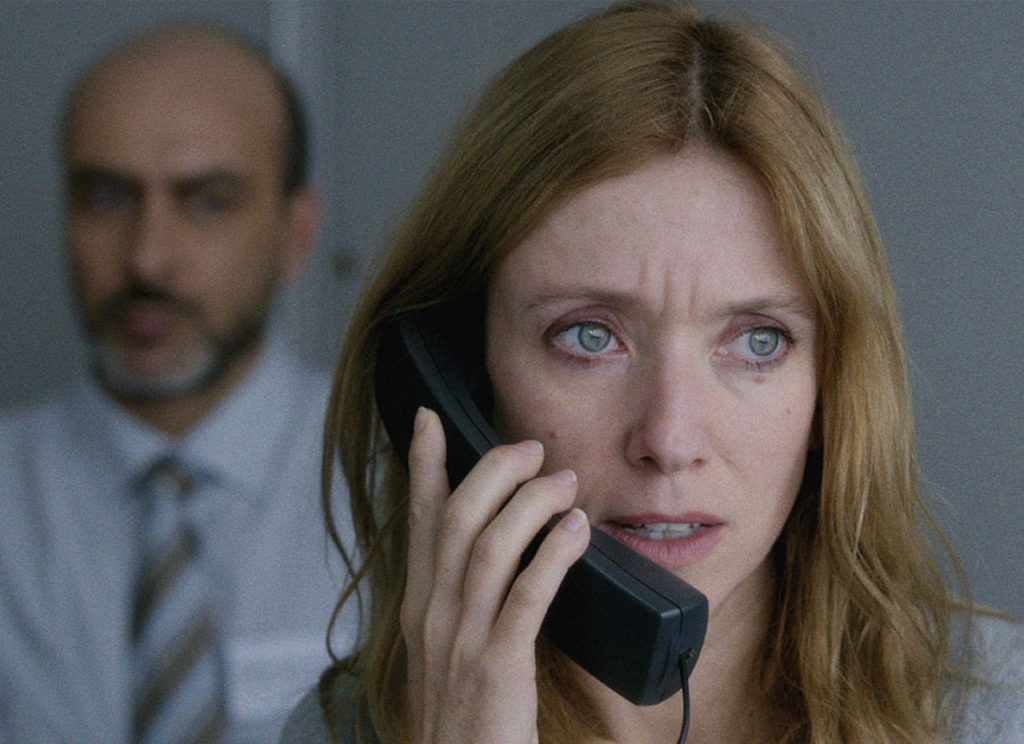
This film takes on the difficult subject of domestic violence and the fear that is present in such abusive relationships. Miriam is the wife and victim of her husband’s abuse and is set on leaving him. But before we find out more, we are given glimpses of the violence’s effect on her two children. This film is tensely driven, not by exposing the audience to the violence directly, but by hinting at the effects of it in the lives of three people and how it spills over into the lives of others who are connected to this family. It asks the question of why more people don’t press charges against those perpetrating such abuse, and demonstrates one possible reason. The film has a strong climatic finish which will leave the audience demanding that such violence no longer be allowed to be perpetrated in the world around us. – Erik Yates
The Voorman Problem
(United Kingdom, 13 minutes)
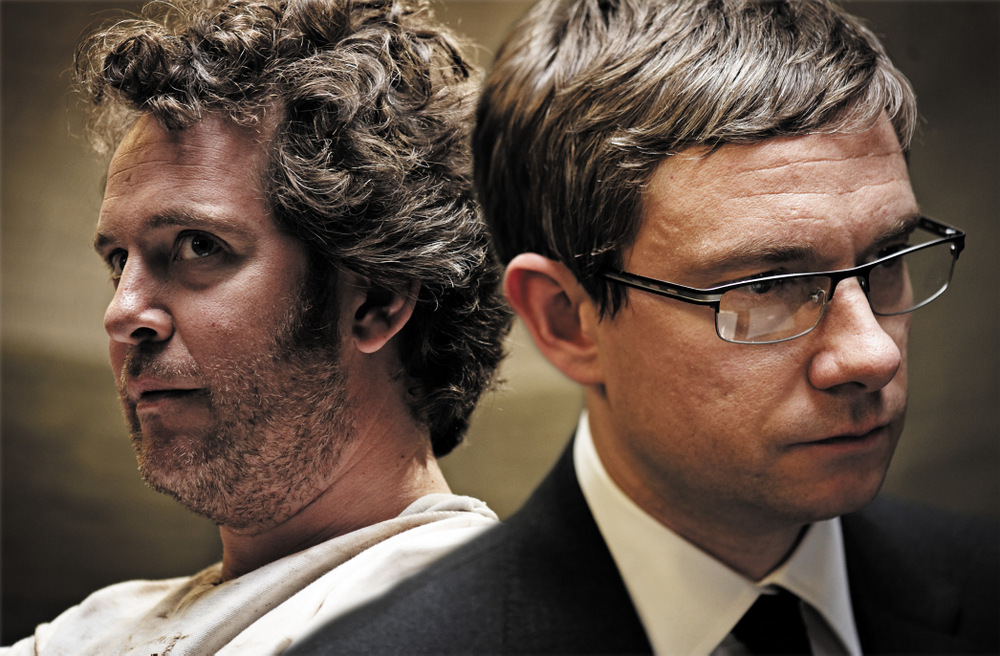
Mark Gill wrote and directed The Voorman Problem which has Martin Freeman (The Hobbit, The World’s End) playing Dr. Williams who is assigned the duty to interview a prison inmate named Voorman (Played by Tom Hollander) who claims to be a god who created the world just 9 days ago. His presence in the prison is having an effect on the rest of the inmate population, and the warden is eager for him to be transferred. However, Voorman is ready to prove who he is despite the doubt coming from both the warden and Dr. Williams. The film is short, even for the short film category it is nominated for, yet is still a lot of fun. The humor, being British, is tongue-in-cheek, but analyzes faith, science, and consequences with a funny, yet fatalistic, twist for one of the characters. – Erik Yates
The Oscar Nominated Short Films 2014 showcase will be playing limited theatrical dates in certain cities, and will become available via iTunes/Amazon Instant Video and Pay Per View/VOD on February 25, a week before the Oscars.

